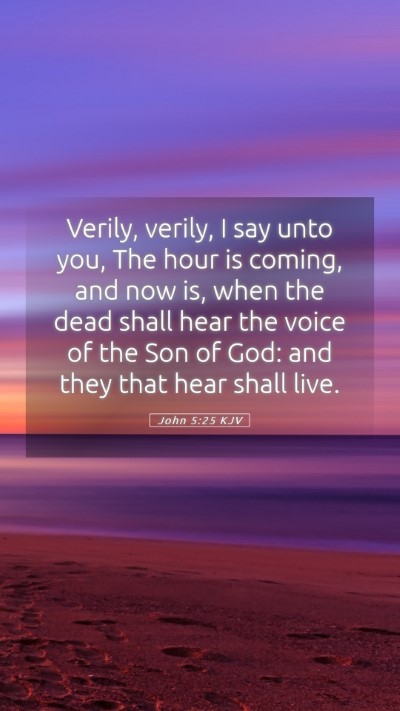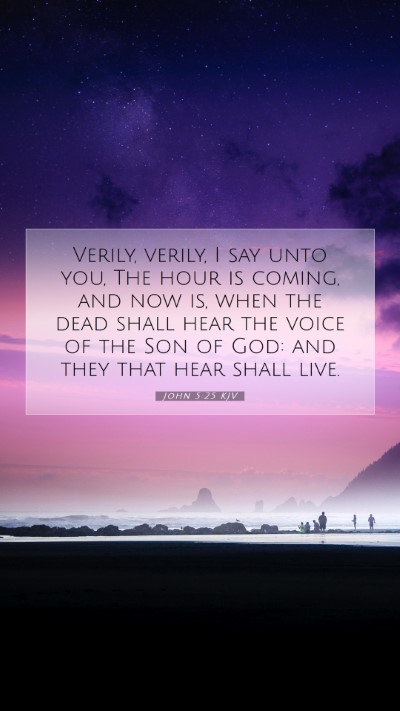Bible Verse Commentary: John 5:25
John 5:25 states, "Truly, truly, I say to you, an hour is coming, and is now here, when the dead will hear the voice of the Son of God, and those who hear will live." This verse holds profound significance in the context of Christian faith and eschatology. Below, we will explore its meanings through insights drawn from public domain commentaries, including those by Matthew Henry, Albert Barnes, and Adam Clarke.
Understanding John 5:25
The passage presents a pivotal moment in the ministry of Jesus, where He asserts His divine authority over life and death. The phrase "Truly, truly," indicates the importance of what follows, demanding attention to His proclamation.
- Voice of the Son of God: This indicates the powerful nature of Jesus' words. As noted by Albert Barnes, His voice has the authority to summon the spiritually dead to life. This aligns with the larger theme of resurrection and spiritual awakening in the New Testament.
- The Dead Will Hear: Matthew Henry elaborates on the 'dead' as those spiritually dead – those who have not yet accepted the gospel. The promise that these individuals “will hear” signifies the transformative capacity of Christ’s message.
Exegesis and Contextual Analysis
John 5:25 is often viewed in light of the broader narrative of Jesus’ authority. Adam Clarke emphasizes that this proclamation about the dead hearing God's voice lays the foundation for understanding the resurrection of both the righteous and the wicked, as further explored in the following verses.
Historically, this declaration comes amid Jesus' confrontation with Jewish leaders regarding His healing on the Sabbath. Thus, the verse also serves as a point of contention between His divine authority and the established religious norms of the time.
Theological Reflections
This verse invites deep theological reflection on the nature of life and death within Christian doctrine:
- Spiritual Resurrection: The implication that the dead will hear refers also to the spiritual resurrection that occurs when individuals respond to the gospel. As stated in scripture, faith comes through hearing (Romans 10:17).
- Eschatological Assurance: The mention of an hour coming signifies a future time of judgment. Here, the "now here" aspect suggests the immediacy of Christ's ministry and the present reality of His saving power.
Application of John 5:25
In exploring applications of this scripture, believers are encouraged to consider:
- The transformative power of Jesus' voice in their lives, urging a personal reflection on their own spiritual state.
- The hope provided by the assurance of resurrection—both spiritual renewal in the present and physical resurrection in the future.
- The active role of Christians to share the gospel, thus calling others from spiritual death to life, embodying the Great Commission (Matthew 28:19-20).
Related Scriptures
For further understanding of the themes present in John 5:25, the following cross-references may prove helpful:
- John 11:25-26: Jesus states, "I am the resurrection and the life." This directly relates to the promise of life after death.
- Romans 6:23: Emphasizes the gift of eternal life through Jesus Christ.
- 1 Thessalonians 4:14: Discusses the resurrection of those who have died in Christ.
Conclusion
The meaning of John 5:25 transcends its immediate context, offering believers insights into the spiritual authority of Jesus and the hope of resurrection. As one reflects on this verse, it becomes a vital part of understanding the central tenets of Christian faith, particularly regarding the nature of life, death, and eternal hope.
Whether in Bible study groups, online Bible study, or personal devotion, this verse encourages deep engagement with the Scripture, fostering a greater understanding of God's promises and Jesus' ultimate authority over life and death.


